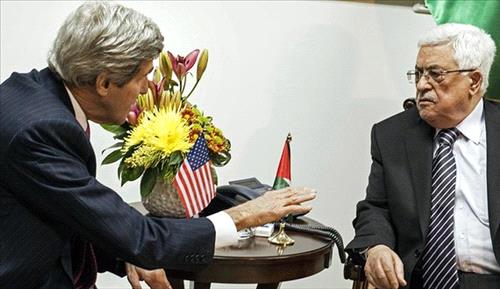Ammon News - U.S. Secretary of State John Kerry is pressuring Israel and the Palestinians to reach a framework agreement acceptable to both sides before Israel’s release of the fourth, and final, group of Palestinian prisoners, scheduled for the end of March.
Kerry is thought to believe that if his efforts do not bear fruit by then the negotiations will break down, either due to Prime Minister Benjamin Netanyahu’s refusal to release prisoners who are Israeli citizens or due to an anticipated surge of construction in the settlements in response to the prisoner release. This could cause the Palestinians to abandon the talks and renew their unilateral actions in the United Nations, a senior Israeli official has said, speaking on condition of anonymity.
Kerry’s unofficial deadline may be in eight weeks, but he and his team are making great efforts to finalize an agreement ahead of the target date. That agreement would presumably extend the negotiations, which were supposed to be completed by April 29, to the end of the year. The Americans want to square away the framework as soon as possible in order to leave as much time as possible for negotiating the core issues.
Kerry will not return to Jerusalem or Ramallah this week, but he is continuing his intense contacts with both sides. He is scheduled to meet this morning in Munich with Israel’s chief negotiator, Justice Minister Tzipi Livni, and with Isaac Molho, Netanyahu’s representative to the talks. They are expected to work on the wording of the framework agreement. Kerry will then meet with Livni’s Palestinian counterpart, Saeb Erekat, toward the same purpose.
Kerry speaks with Netanyahu and with Palestinian President Mahmoud Abbas on a near-daily basis.
Kerry came to Munich after meeting German Chancellor Angel Merkel and Foreign Minister Frank-Walter Steinmeier in Berlin on Friday. Steinmeier was in Jerusalem and Ramallah two weeks ago, and Merkel is scheduled to visit the region later this month.
Kerry presumably asked for German help in pressuring both sides to accept the framework agreement he is expected to present soon.
Representatives of the Quartet met on Monday. Kerry briefed Russian Foreign Minister Sergey Lavrov, UN Secretary General Ban Ki-moon and European Union foreign minister Catherine Ashton on the status of the framework agreement and asked participants to persuade Israel and the Palestinians to more flexibility over its terms
Speaking at a panel at the Munich Security Conference on Saturday, Kerry said: “You see for Israel there’s an increasing delegitimization campaign that has been building up. People are very sensitive to it. There are talk of boycotts and other kinds of things. Are we all going to be better with all of that?"
He said the prosperity and security Israel was now experiencing was temporary: "[T]oday’s status quo absolutely, to a certainty, I promise you 100 percent, cannot be maintained. It’s not sustainable. It’s illusionary. There’s a momentary prosperity, there’s a momentary peace. Last year, not one Israeli was killed by a Palestinian from the West Bank. This year, unfortunately, there’s been an uptick in some violence. But the fact is the status quo will change if there is failure. So everybody has a stake in trying to find the pathway to success.”
The State Department denies Indyk’s claims
The description of a possible U.S.-drafted framework for Israeli-Palestinian peace that Martin Indyk, the top U.S. Middle East envoy, delivered to a group of Jewish leaders was not final, the State Department said.
“During an off the record briefing with Jewish leaders, Ambassador Indyk reiterated the well-known United States position in support of 1967 borders plus swaps as a part of a broad discussion on ideas being discussed for a framework,” Jen Psaki, the State Department spokeswoman, said in a statement Friday, a day after the call.
“But given this is an ongoing process and these decisions have not yet been made, at no point did Ambassador Indyk make a prediction of the final contents of a framework,” Psaki said.
Indyk described detailed security arrangements on the Jordan-West Bank border, a settlement of the refugee question, the terms for mutual recognition of Israel as the nation state of the Jews and Palestine as the nation state of the Palestinians, and land swaps.
State Department officials said there is not an expectation that the framework would be completed in “weeks,” although Indyk had said it was his hope that it would.
Regarding Indyk’s reference during the call to the expectation that land swaps would allow 75-80 percent of settlers to stay in Israel, the officials said that arose not from the current talks but from previous estimates during the 20-year-long peace process.
*Haaretz
